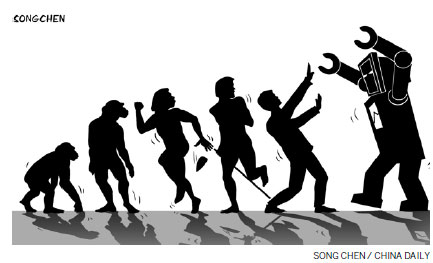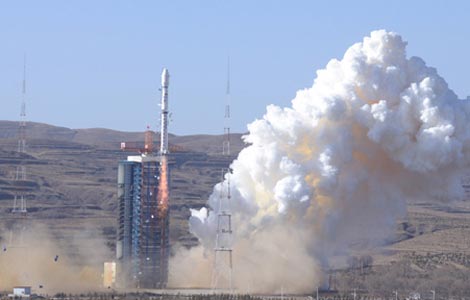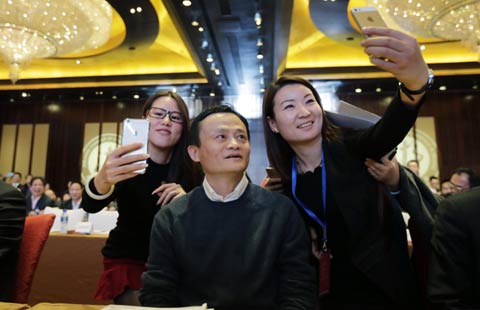Obscure intentions of a dangerous mind
Updated: 2014-12-08 07:40
By Hannay Richards(China Daily USA)
|
||||||||
Forget terrorists, forget climate change, or anything else that has been keeping you awake at night, instead worry about who or what your smartphone might be talking to if you leave it on when you go to sleep - and no, that doesn't mean the NSA, it already knows all about you.
Although it might be a little far-fetched to imagine your phone is out to get you - at least the phone itself - it might not be beyond the realms of science fiction for a computer to have designs on your life.
Last week, Stephen Hawking, one of the world's leading theoretical scientists, cautioned that thinking machines that can match or surpass humans could pose a threat to our existence.
Speaking to the BBC, he said: "The development of full artificial intelligence could spell the end of the human race."
Hawking is not the only one to have rung this alarm bell. Addressing students at the Massachusetts Institute of Technology at the end of October, Tesla chief executive Elon Musk said: "I think we should be very careful about artificial intelligence. If I were to guess, like, what our biggest existential threat is, it's probably that."
Artificial intelligence already exists of course; we encounter it in our daily lives in various forms, for instance the targeted services companies such as Amazon, Apple and Google. The popularity of such "intelligent" products and services shows people aren't too concerned about such action going on behind what they see so long as it brings convenience, and the danger here is probably how such "smart profiling" is used rather than the power of the computing itself.
But it is not computers' commercial nous or Siri that Hawking and Musk are concerned about; they are wary of the approaching so-called singularity, the point when artificial intelligence will exceed human intellectual capacity and control. To be truly useful, artificial intelligence must be able to make decisions, but such autonomy also means the ability to act independently.
It seems reasonable to suppose this will mean artificial intelligence which is self-aware, and there will be a dramatic difference between very smart software and intelligent software that thinks, therefore it is. And at that point a very stark difference between it and us - one that will only grow wider.
As Hawking said, "It would take off on its own, and re-design itself at an ever increasing rate ... Humans, who are limited by slow biological evolution, couldn't compete, and would be superseded."
Even if we are just trying to simulate human intelligence, the outcome of a self-aware machine is likely to be very different from what was intended given that we know so little about what goes on inside our heads.
And at some point how will the designers know if what they are designing is not being programmed by themselves. They could be within a feedback loop that is designed to evolve itself.
A self-aware artificial intelligence is unlikely to show much empathy with us, it will be something totally other; at best it will see us as some kind of pet, perhaps some kind of pest, or more likely it will know we are the biggest threat to its existence and seek to protect itself.
At the moment we are at the embryonic stage of artificial intelligence, and although people like to use the quip - why worry, we can just pull the plug - it is not likely to make itself known to us by coming bawling out of its cyber womb or by saying "mama"!
The author is a writer with China Daily. hannayrichards@chinadaily.com.cn

(China Daily USA 12/08/2014 page12)

 China, Brazil pledge to promote science, technology co-op
China, Brazil pledge to promote science, technology co-op
 ZTE, NBA team partners in business, charity
ZTE, NBA team partners in business, charity
 'Big' Peking opera staged in New York
'Big' Peking opera staged in New York
 250 Santas hit slopes for charity
250 Santas hit slopes for charity
 Jack Ma awarded Honorary Chairman of Zhejiang Chamber of Commerce
Jack Ma awarded Honorary Chairman of Zhejiang Chamber of Commerce
 2014 Yearender: Life underground
2014 Yearender: Life underground
 South China's 'little Africa'
South China's 'little Africa'
 Trending: Eiffel Tower replica in Hangzhou
Trending: Eiffel Tower replica in Hangzhou
Most Viewed
Editor's Picks

|

|

|

|

|

|
Today's Top News
Illinois university signs agreements with Chinese college
ZTE, NBA team partner in business, charity
Chinese investors in Brazil told to avoid risks
Economists call for increased public spending in China
Xiaomi's smartphone taps into US market
Peruvian product hit in Chinese market
Chinese role expected in Mexico's energy reform
Brazil film festival delights Beijing and Shanghai
US Weekly

|

|







